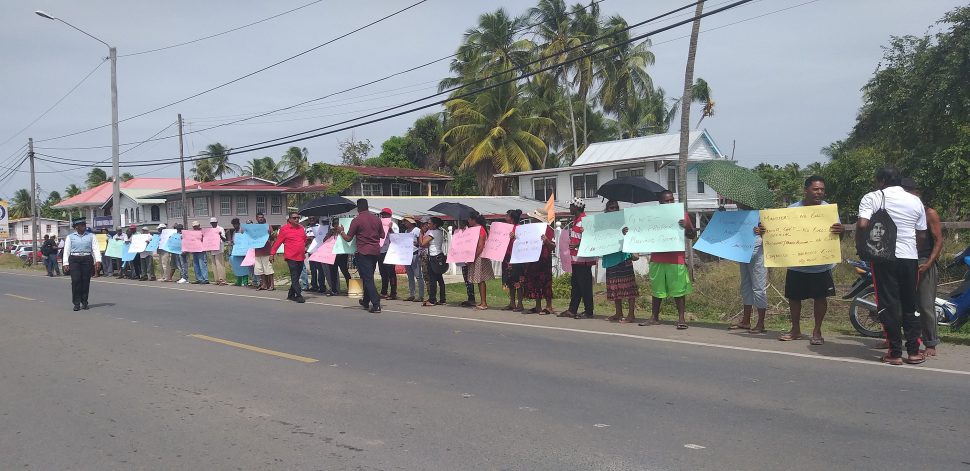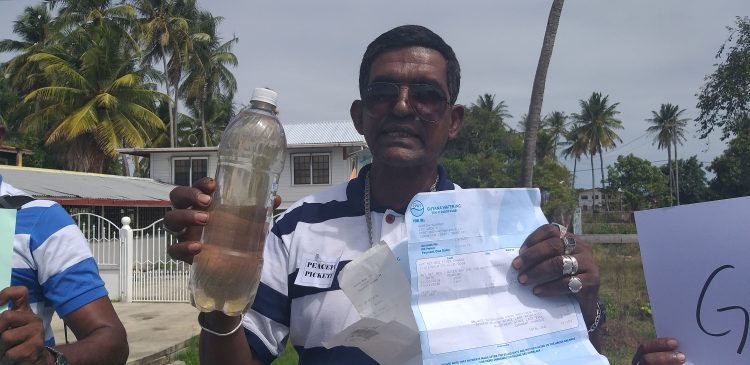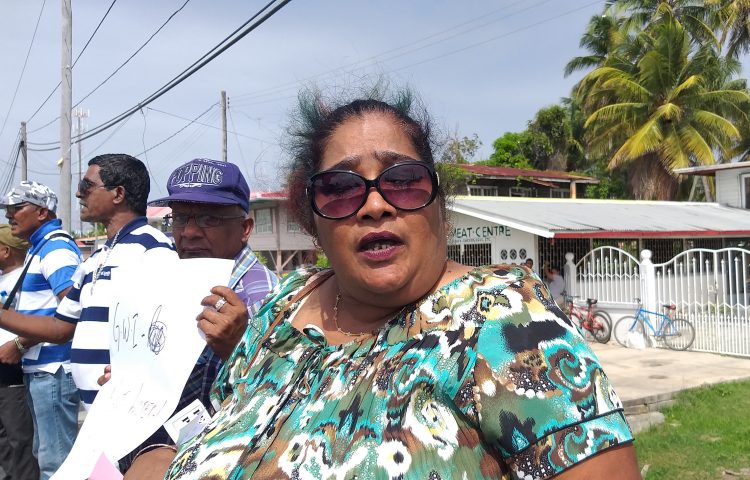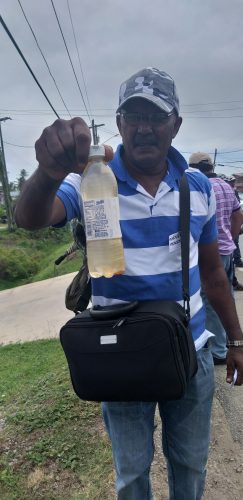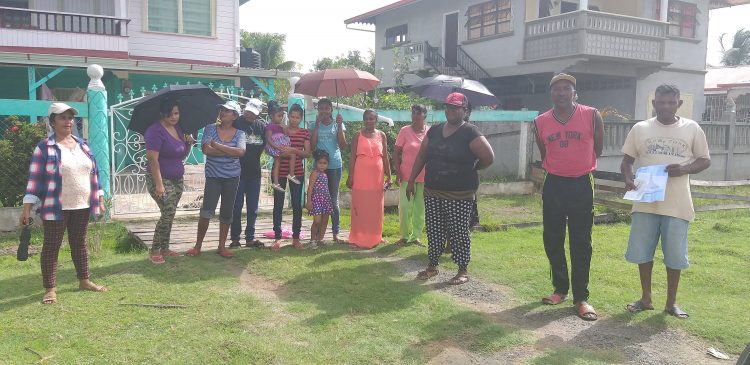Berbicians yesterday took to the streets to protest what they say are sudden hikes in charges for water, which most of them said they would not be able to afford.
The protest, which was organised and supported by the People’s Progressive Party/ Civic, Region Six, was carried out in front of the Guyana Water Incorporated (GWI) office at Chesney, Corentyne, where residents said they did not understand the rates being charged for December and January.
A peaceful picketing exercise started at 10 am and concluded sometime after midday. The residents called on the government to look into the matter immediately and come up with a solution, as they stressed that they cannot afford such major increases presently.
GWI, in a subsequent statement, said that its “harmonization of rates is an incremental one, which took effect on October 1, 2018 and was approved by the Public Utilities Commission.”
“Contrary to the utterances of the protestors today, GWI has made special provision for pensioners in its harmonisation of rates, with this category of persons being exempted from paying the new fixed monthly charge of $250,” the statement, issued by GWI’s Assistant Public Relations Officer, Chriseana Ramrekha, added.
However, when asked if the figures protested by the customers are linked to the new rate structure, Ramrekha told Stabroek News via phone that the statement speaks generally to the company’s increased rates.
The statement issued by GWI yesterday afternoon highlighted that metered pensioners now pay a charge of $74 per cubic meter (m3) for the first 10m3 and $86 for each m3 used thereafter. Unmetered pensioners pay a rate of $740 per month.
In the telephone interview, Ramrekha noted that the company is open to investigating the claims of the customers.
‘Never had to pay such a large amount’
Rohanie Mana, of Belvedere Squatting Area, told this newspaper that she had cleared her bill up to November last year and was expected to pay her November and December bills early this year. However, she said, to her surprise the bill for November and December came to a total of $23,500. “From October to November, $3,500 me bill come and November and December, $23,500, so me want fa know wa me do with that water, she said.
Mana, who was present yesterday to query her bill at the GWI office, joined the protest after.
According to the woman, after she queried her bill, she was still told that she would have to pay the entire amount.
Mana, who expressed her disgust at the sudden increase, noted that she has had a water meter for over ten years now and has never had to pay such a large amount for her use of water. “I am a widow and me have a paralysed 38-year-old son. Me na know where me go find this money to pay this bill from,” she said.
The woman stated that she asked the clerk at GWI whether someone could make a check on her water meter to ensure it is working properly. However, she said that she was informed that the meter was working well and no one was present to carry out such a check. “She (clerk) say the meter have no fault and me have to pay my bill. Me know if me na able pay them gone cut off,” she stated.
Another resident, Pittamdai Tamradwagh, explained that her water was disconnected shortly before Christmas because she had owed the company $4,500. “Me come, pay me connection fee $7,500 and now when this month bill come them say me get an outstanding $5,400 and me bill come to $3,700 and me got to now pay $9,100. Where me must get all them money this?” she questioned.
“Me a one widower, me alone a live, me na use nuff water,” she added.
Rajendranauth Khedarnauth, of Number 19 Village, Corentyne, said that he cleared his bill in 2018. However, on January 4, 2019, he received a bill stating that he owed the company $14,100 for the period of December, 2018.
The man said he also received a second bill in January for $2,240. “This bill na get no period,” he explained.
Khedarnauth brought a bottle of water filled with rust from his home. “This is na purified water and we have to pay this large sum of money. How we can cook with this? How we can drink with this? How we can wash with this?” he questioned.
The man said, he hopes that residents can return to paying a fixed rate. “Let them carry them meter and let we pay,” he suggested.
Homesh Swamber, of Lot 170 Ankerville, Port Mourant, Corentyne, stated that in October, 2018, he received a bill for $2,700. “When I got that bill, I go into GWI and pay $6,000, which means I paid in advance for November. In November now, them sent me a bill for $1, 300 and I didn’t pay that bill because I say I have excess money there. They sent me a bill in December now that I owe them $2,800 and my December bill is $10,155. Now, I don’t know. I’m not surprised with this because the government don’t know what mathematics is. I can’t give GWI for not knowing mathematics,” he said.
Swamber also walked along with a bottle of water filled with rust.
Not harmful
Responding to the high iron content in the water supplied to residents, GWI said water quality at the utility’s facilities is “continuously monitored to ensure that customers receive the best quality of water possible.”
It added, “Every effort is made to flush the pipelines on a weekly basis, so as to preserve water quality” and it pointed out that it has been monitoring the #63 and #69 pump stations, which serve Number 61-74 villages, and over the past two months the water quality has been within the World Health Organization’s parameters.
Iron, which may be aesthetically displeasing, is not harmful to health and the two pump stations have over the past two months recorded low iron content, GWI added.
GWI, in its statement, further affirmed its commitment to improving water quality in the East Berbice- Corentyne region.
In its continued effort to improve its service, GWI said, a new well at Port Mourant, which serves some 20,000 residents from Tain to Albion, was commissioned last Thursday and has resulted in distribution hours being increased from 8 hours to 16 hours.
Additionally, the statement noted that the company is presently working to re-commission the Williamsburg well, expected to be done today, Tuesday, 15th January, 2019 and this is expected to allow for the 24 hour supply of water to residents in communities which include Belvedere, Tain, Hampshire, Port Mourant, Rose Hall Town and Williamsburg.
In response to the statements by protestors regarding the company’s billing system, GWI said it “wishes to categorically state that Region 6 boasts 97% bill delivery efficiency and recorded 100% bill distribution in December, 2018.”
Stabroek News attempted to meet with the manager of the GWI Chesney office yesterday. However, when its reporter entered the compound, the security guard present said, “Hello, you is media. You have to wait here, let me go ask the manager if he will meet with you.”
The security guard then entered the building and returned and said that the manager would not be speaking with the media and added that all recording devices, including cellphones, would have to be left at the “security hut” if this newspaper wished to enter the building to clarify anything on “your bills.”
In December, hundreds of residents in Canje were disconnected because they had owed GWI. The residents had argued that they owed small amounts and that the bill came to their homes one day after they were disconnected.
Additionally, residents in Canje in late December, 2018, had contacted Stabroek News and expressed their frustration at the sudden tariff increases as well.
One former sugar worker had explained that after losing his job at the Rose Hall Estate, he could not afford to pay his water bill, which led to him being disconnected. In December the man was unsure when he would be able to clear his bill and pay his reconnection fee, which led to him and his family going through the holidays last year end without water.
This was the same for many other severed sugar workers families in the Canje Area.
